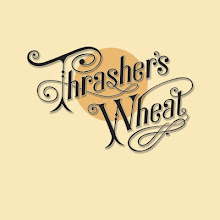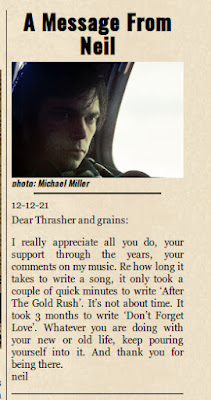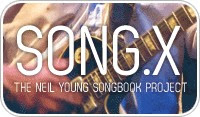Half-Decade of Neil Young's Music from 1972-76: A Comprehensive, Meticulous, and Flowing Account

Uncropped Image for Neil Young's Decade
by Tom Wilkes
(See Neil Young's Decade: The Images Behind The Album Cover )
Half-Decade: A Comprehensive, Meticulous, and Flowing Account of Neil Young's Music from 1972-76
by Metamorphic Rocker
Part I: Homegrown>Old Homestead>Walk On
July 2021
Neil Young's second Archives compendium arrived more than ten years after the first.
It covers half the time span of Vol. I (which runs from Neil's earliest known 1963 recordings to the commercial apogee of Harvest, released in early '72). Arguably, though, Archives Vol. II compensates for breadth with depth, offering (for this fan) about twice the value in content of its precursor. This is a subjective take, however: depending on which albums or epochs of Young's work you most appreciate, the music may or may not be more rewarding than what Vol. I offered. For deluxe bells and whistles, certainly, this 10-CD box set does not match the original DVD or blu-ray editions of Vol I. Essentially, the mass market release of Vol. 2 is equivalent to Vol I.'s CD release: the economy edition. If one wanted all the trimmings, one would’ve had to catch the limited edition released last November exclusively through Neil Young's website at $250.00 a pop.
Personally, although I still love the big book that came with Vol I., I don't mind not having to search for storage space for another file cabinet-sized box. In most respects, and particularly for the interests of the average consumer, the compact Vol 2 CD box is an aesthetic and practical improvement in design. If anything, it makes the Vol. I box look sprawling and clumsy by comparison. While I did enjoy the immersive experience of Vol I (and the 1966-67 Buffalo Springfield demos and outtakes in particular offer from pure gems), this time they've cleaned up the formatting, making the package sleeker at no cost to music quantity or quality.
This review will be split into several installments, each concentrating roughly three or four of the ten discs: one part will cover Crazy Horse (Tonight’s the Night/Roxy/Dume/Odeon-Budokan); another for the Stray Gators (Everybody’s Alone/Tuscaloosa) plus the Stills/Young Band era (Look Out for My Love); and this, the first installment, which will focus on what amounts to a bridge between Gators and Horse: the late “ditch” period recordings documented on Homegrown, The Old Homestead, and Walk On).
I prefer to start in the middle because Homegrown, a “lost” album which was released on its own ahead of the box set and is the only disc that was designed at the time of recording as a cohesive album, is in many ways the core and lynchpin of this period of Neil Young’s career, encompassing within a concise yet erratic self-portrait all of the sounds, styles, and moods that haunt the other discs in a less concentrated form. Homegrown, in other words, captures the essence--the ethos and the flavor--of the music Young was making in this period, and although at the time, it was shelved in favor of Tonight’s the Night, it sounds remarkably like a melding of Harvest and On the Beach. Interiority is the word that comes to mind for this record. The tinkling piano of "Mexico" is almost too beautiful and fragile, its lyric a thin vapor trailing into the familiar weary twang of "Love is a Rose". "Rose" and the closing "Star of Bethlehem" (with Ben Keith’s sweet harmony vocal raised in the mix) are the same recordings featured on Decade and American Stars 'n' Bars, just as the severely underrated "Little Wing" is the track eventually released as Hawks and Doves' opener.
The album’s fragmentation is its cohesion, its patchwork flow of loose ends and stray notes coming together as a vivid portrait of a fractured, strained psyche. The looseness of recordings like “Homegrown”, “We Don’t Smoke it”, “Florida” (featuring only voice, piano strings, and wine glasses), and “Kansas” perfectly evoke a sense of malaise and confusion that make this one of Neil’s most enigmatic and deeply contemplative albums. A fascinating aspect of Homegrown that has been overlooked is how its first half, in particular, mimics the structure of Harvest’s side one. Compare the doleful opener, “Separate Ways” (of which more is to be said when we reach the Stills-Young disc) with “Out on the Weekend”. Take the London Symphony off of “A Man Needs a Maid” and end up with a song eerily close, in feeling and structure, to “Mexico”. “Love is a Rose” is the would-be single to follow up “Heart of Gold”, another country-inflected anthem about searching restlessly for love.
***
Many thanks here Meta Rocker! Indeed, a "Comprehensive, Meticulous, and Flowing Account!" Very much looking forward to future installments on Full Moons!
No problem on length or complexity. We're trying to make this blog something along the lines of "anti-short attention span" writing.
Enjoy and give Meta Rocker some feedback!
Labels: neil young, neil young archives, nya































 Human Highway
Human Highway

















 Concert Review of the Moment
Concert Review of the Moment





 This Land is My Land
This Land is My Land

 FREEDOM In A New Year
FREEDOM In A New Year









 *Thanks Neil!*
*Thanks Neil!*




![[EFC Blue Ribbon - Free Speech Online]](http://www.thrasherswheat.org/gifs/free-speech.gif)











 The Unbearable Lightness of Being Neil Young
The Unbearable Lightness of Being Neil Young Pardon My Heart
Pardon My Heart



 "We're The Ones
"We're The Ones  Thanks for Supporting Thrasher's Wheat!
Thanks for Supporting Thrasher's Wheat!




 This blog
This blog 
 (... he didn't kill himself either...)
#AaronDidntKillHimself
(... he didn't kill himself either...)
#AaronDidntKillHimself









































































 Neil Young's Moon Songs
Neil Young's Moon Songs




 Civic Duty Is Not Terrorism
Civic Duty Is Not Terrorism Orwell (and Grandpa) Was Right
Orwell (and Grandpa) Was Right


 What's So Funny About
What's So Funny About 



18 Comments:
A beautifully written and articulate review, and no surprise coming from our dear friend Meta Rocker. Looking forward to reading more, and enjoy the deep dive into the Archives Volume Two. Great job so far.
Peace 🙏
First rate, stellar. Dan is right, not surprising as it comes from such a smart and insightful person.
Fantastic! 100% on the Harvest comparison; the track orders elevate these albums from collections of songs to artistic statements. Looking forward to more of your takes. Vol. II is endlessly fascinating. I’m glad to have purchased the book separately. The tape log that follows the photographs offers insight into the process not found elsewhere.
Thanks for the comments, guys… incidentally “comprehensive, flowing and meticulous” is meant to be my description of NYA2, not blowing my own horn!
Given the structural complexities (this is technically part 1 of part 1 of 3, if that makes any sense), I’ll have to be careful with the formatting of entries going forward. Call this part 1, the next part 1.5. I guess by the end my numbering will be as straight forward as the Archives itself.
Always receptive to feedback on review, of course!
I think "cohesion through fragmentation" (I think that is the quote but it is close enough) is very important because it connects Neil's music to human struggle generally. You might say more about the details of this theme in relation to the specific songs.
This comment has been removed by the author.
Its fragmentation is its cohesion. Let me try again as I was too hasty. Neil's strained psyche perhaps connects in unexpected ways to so many of us. The idea that our lives and minds are thoroughly cohesive and coherent is inconsistent with what we know about ourselves? Cohesion is an ongoing struggle and there are times, perhaps, when we should let go of the struggle and ride out the fragmentation, see where it leads, what it could reveal, and how it truly point the way to something beyond our relentless struggles (with ourselves). Neil gave me solace when I was most disturbed and unstable because he seemed to say: this is where you can get a glimpse of the truth.
Excellent observation Abner, I understand completely with what you’re saying. Those difficult times are filled with gold if one is able to ride it out to its conclusion.
Peace 🙏
I saw both of your comments Abner, and these are ideas I certainly want you to unpack.
narrative art often reveals a lack of self-understanding, which is one way to describe the human condition. The endeavor that some people undertake for cohesion and coherence, probably most of us undertake, is always incomplete. Sometimes an artist, say Ray Carver, intentionally shows us how our lack of self-understanding is part of a tragic circumstance (a necessary aspect of a tragic circumstance). Neil seems to embrace his "fragmentation" as an inherent truth about himself and then as a way to recover, redeem, or discover. Only through the recognition of our ongoing failure to understand ourselves can we get close to understanding ourselves. This is not a paradox or a contradiction. It is a statement that first embraces "species knowledge" and then brings it to the individual. Art has to here take the lead over any science, although psychology clearly does reveal the cracks in self-understanding. Ultimately the conclusion goes to uncertainty and humility with respect to our own judgments about ourselves and others. It is hard enough to get glimpses of myself, much less be certain about someone else.
I choose the phrase "species knowledge" as a way to avoid anything that conjures souls or minds, etc.., I am talking about the embodied, biological self.
Abner, There was a slight typo in my previous reply. I meant to type "These are certainly ideas I want to unpack". lol. Also, the review series may be delayed again in view of thrasher's last post.
That begin said, your observations are invaluable. Since I work with narrative fiction, drama, and film, I think about "narrative art" a lot. It seems to me some of Neil's songs (as with many artists) are more narrative-driven than others, and there's an interesting question as to whether or how much music can be narrative.
I guess I tend to see a spectrum of "narrativity" in most, if not all, art forms. Some of my favorite movies are non-narrative (or anti-narrative; various words have been used), precisely because they often seem to get closer to the realities of human experiences. There's a whole body of lyric cinema, trance film, underground, etc., mostly building from the mid-20th century avant-garde. The paradox, in my opinion, is possibly an artifact of the human tendency to see life not just in narratives, but in narratives grounded in binaries: part and whole, fragmentation and cohesion, something and nothing. The real challenge is to make more out of philosophy than word games.
The typo news comes as a relief. I was wondering about the request as it does not seem like you need me to unpack anything. I am a professor of philosophy and write/research on the philosophy of fiction, ecology, and the relationship between philosophy/humanities and the sciences. The idea that philosophy if a "word game" makes me literally sick (unless we are talking Wittgenstein unravelling ontological/epistemic problems by unravelling the grammar). I don't play with those people who enjoy word games. For me the stakes are high and questions are deep, no fooling around.
Abner, I was actually thinking of Wittgenstein and others. My point was that it’s too easy for philosophical and critical discourses to get lost or tangled up in logos—it’s very difficult, if not impossible, to divorce ideas from the words we use to convey them, so a lot can hinge on how you understanding the meaning of a particular term—and it’s important to reach a place where discourse and formal philosophy means something beyond just word games. So we’re not too far apart… I think? Certainly didn’t mean to make you sick with my possibly misplaced flippancy.
Art, speaking broadly, tries to express many of the same ideas as philosophy from outside the framework of formal philosophical discourse or writing, which makes art less precise but also, arguably, less rigidly coded. In psychoanalytic terms, it’s possiblr describe art as pre-oedipal or outside the law of the father— a (Freudian?) double-edged sword. So I guess I do play with words, but (I hope) as a means to an end or several ends.
I would distinguish between what Wittgenstein did and word games. Wittgenstein finally got to the very bottom of mind/body dualism with the private language argument, which is about the very nature or possibility of meaning and communication. The private language argument goes to the conditions of establishing meaning (far beyond grammar or ordinary language philosophy). I think I agree with some of these broad points you make about art, not sure yet. Nothing you said made me sick! I was thinking about the glib and flippant ways some academics play around with metaphysical and epistemic issues, usually not people actually trained in philosophy.
Abner, I guess my “take” may be a little more influenced by postmodernism… some of these ideas have a different utility when looking at literary and cultural texts, but it’s all about how these works can increase our understanding of the world and help answer important questions/problems. Ludic impulses aside, some kinds of play can offer great insights in the right context.
we got a bit off track. Your point about fragmentation and cohesion, well worth more discussion in your review.
Post a Comment
<< Home